Wakefield Community Access Television sponsored a debate between the major party candidates for the state Senate seat in the 5th Middlesex District on September 19. Incumbent Jason Lewis and challenger Erin Calvo-Bacci squared off on a number of issues including the opioid crisis, education funding, and the state-wide questions on the ballot this November. The debate, moderated by William Carroll, featured questions posed by Bob Burgess of the Wakefield Daily Item.
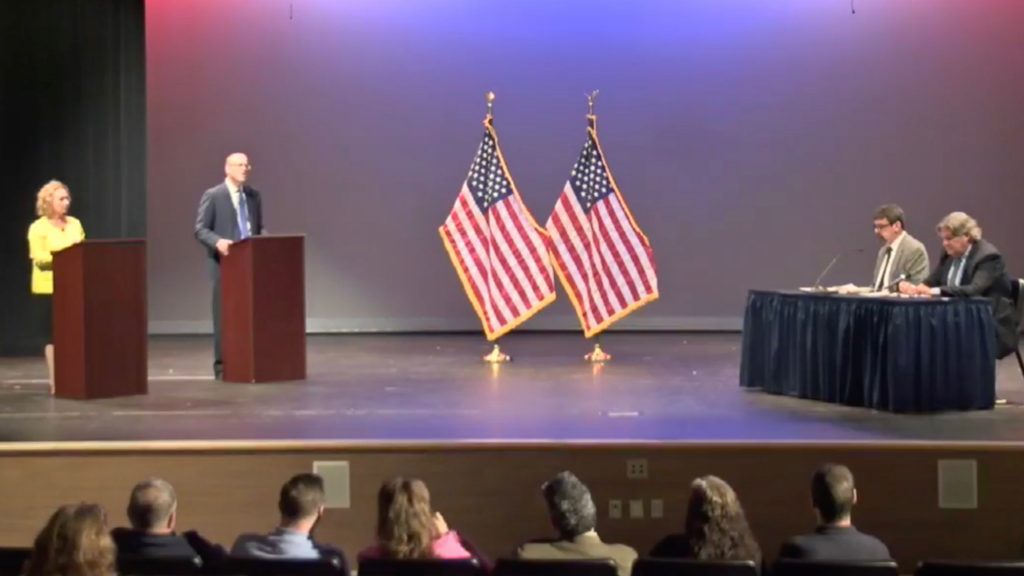 In her opening statement, Calvo-Bacci highlighted her “deep roots” in the community and her experience as a local business owner. Lewis touted his record of service as state senator since 2014, highlighting his track record helping bring millions of dollars in state funds back to communities in the district. When asked about the opioid crisis, Lewis continued to speak of the work that has been accomplished including expanded access to treatment for those addicted to opioids. He also suggested that working to change the prescribing behavior of medical personnel would reduce access to the drugs. Calvo-Bacci countered, recognizing what has been done but stated, “We need to go further.” She highlighted the need for more coordination with schools and getting police forces better support.
In her opening statement, Calvo-Bacci highlighted her “deep roots” in the community and her experience as a local business owner. Lewis touted his record of service as state senator since 2014, highlighting his track record helping bring millions of dollars in state funds back to communities in the district. When asked about the opioid crisis, Lewis continued to speak of the work that has been accomplished including expanded access to treatment for those addicted to opioids. He also suggested that working to change the prescribing behavior of medical personnel would reduce access to the drugs. Calvo-Bacci countered, recognizing what has been done but stated, “We need to go further.” She highlighted the need for more coordination with schools and getting police forces better support.
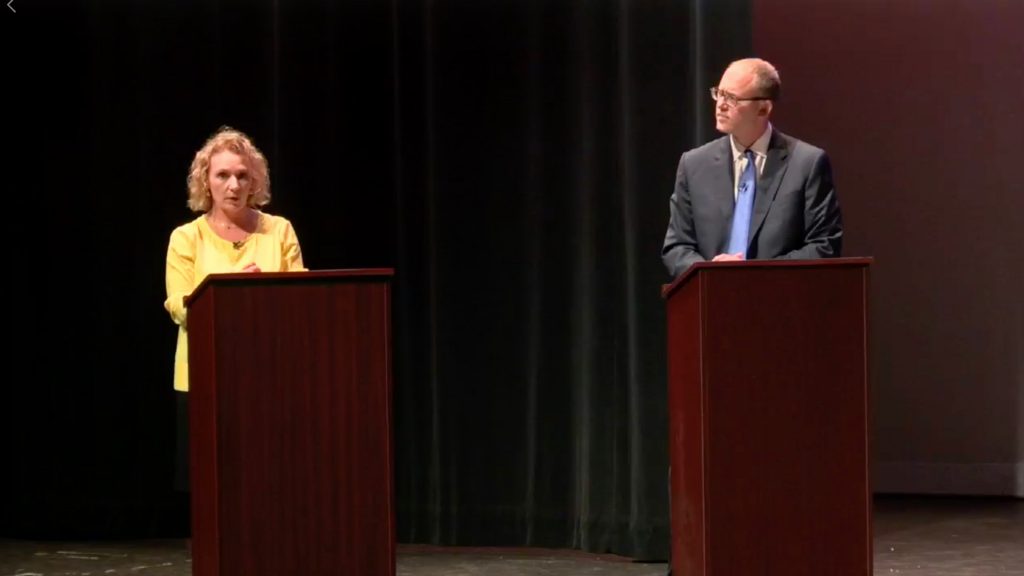 When asked what the highest priorities are for the district, Lewis listed health care, housing costs, child care, and college costs. He then suggested that he was the candidate with progressive values that put people first on these issues. Lewis went on the offensive, suggesting that his opponent’s “right-wing” positions place profits over people. Calvo-Bacci defended herself by stating that, as a business owner, it is her job, not the government’s job, to see that her employees got what they need. She suggested that minimum wage hike [to $15 an hour] hurts the people that work for her because it raises the costs for everything her workers need, including childcare. She also shared that her business already offered paid family leave without government insistence. She believes that she has an understanding of people’s needs. “I’m there at the grass-roots level,” Calvo-Bacci stated.
When asked what the highest priorities are for the district, Lewis listed health care, housing costs, child care, and college costs. He then suggested that he was the candidate with progressive values that put people first on these issues. Lewis went on the offensive, suggesting that his opponent’s “right-wing” positions place profits over people. Calvo-Bacci defended herself by stating that, as a business owner, it is her job, not the government’s job, to see that her employees got what they need. She suggested that minimum wage hike [to $15 an hour] hurts the people that work for her because it raises the costs for everything her workers need, including childcare. She also shared that her business already offered paid family leave without government insistence. She believes that she has an understanding of people’s needs. “I’m there at the grass-roots level,” Calvo-Bacci stated.
Lewis was asked if he supports changing the formula for Chapter 70 state funding for school districts. He stated that education funding was one of the reasons he ran for state senate initially and that he is a leader in the senate for fixing the funding formulas. “I personally am very committed to this change,” Lewis commented. He continued, proposing to pay for additional education funding with the adoption of the “fair share” amendment, known as the Millionaire’s Tax, which places a higher tax rate on those earning the highest incomes. Calvo-Bacci responded that she believes that schools need to be unburdened from the costs of unfunded mandates, where schools are required to perform certain services by the state with no offer from the state to help pay for them. She offered that schools need to help fill the “skills gap,” teaching workforce skills to students not headed to college. She also suggested that the Millionaires Tax had been found to be unconstitutional and could not be implemented.
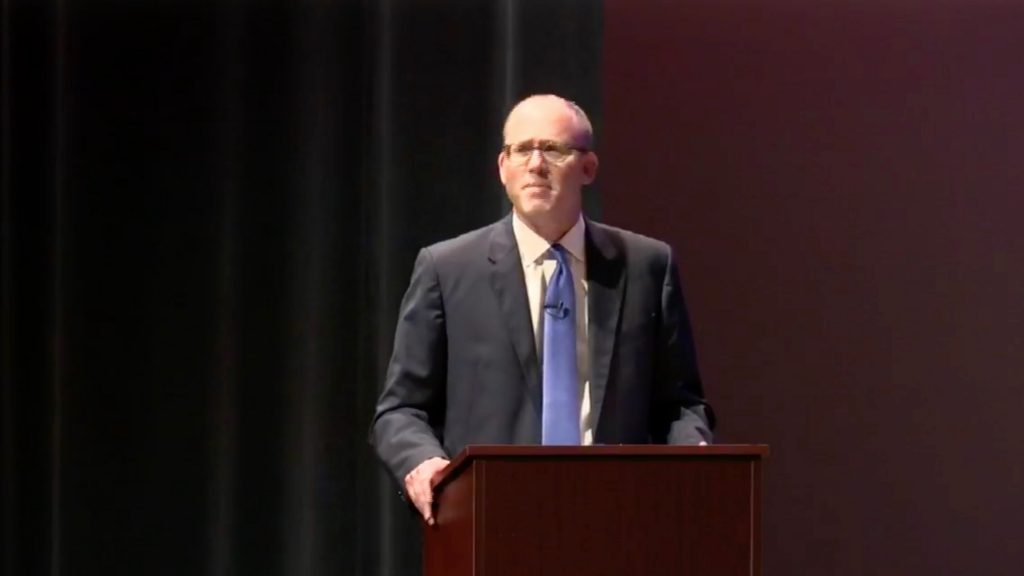 Candidates were asked about rolling back the sales tax to 5%. Lewis answered with an emphatic “no” explaining that he believes that a rollback would not be good for people who rely on the $1.2 billion in revenue that would be lost, including students, seniors, and those dependent on MassHealth. He suggested again that shifting the tax burden to “those most able to pay” would ease funding issues. Calvo-Bacci stated that she is in favor of the rollback. She believes that Massachusetts businesses are losing business to New Hampshire and Internet businesses. She shot back at Lewis asking, “Did you think about how it hurts people when you take a pay raise?” She then shared that as a business owner, her employees are compensated first, before she gets paid. “Beacon Hill needs to make sure all of the people are taken care of first.” she declared.
Candidates were asked about rolling back the sales tax to 5%. Lewis answered with an emphatic “no” explaining that he believes that a rollback would not be good for people who rely on the $1.2 billion in revenue that would be lost, including students, seniors, and those dependent on MassHealth. He suggested again that shifting the tax burden to “those most able to pay” would ease funding issues. Calvo-Bacci stated that she is in favor of the rollback. She believes that Massachusetts businesses are losing business to New Hampshire and Internet businesses. She shot back at Lewis asking, “Did you think about how it hurts people when you take a pay raise?” She then shared that as a business owner, her employees are compensated first, before she gets paid. “Beacon Hill needs to make sure all of the people are taken care of first.” she declared.
Calvo-Bacci was asked if she was in favor of the ballot question regarding the law prohibiting discrimination of transgendered persons. She answered that while she did not oppose the question, she did feel as though voters do not receive enough education regarding ballot questions and that many do not understand what they are voting for. Lewis responded by saying, “I stand on the side of our LGBTQ neighbors. I will vote yes.”
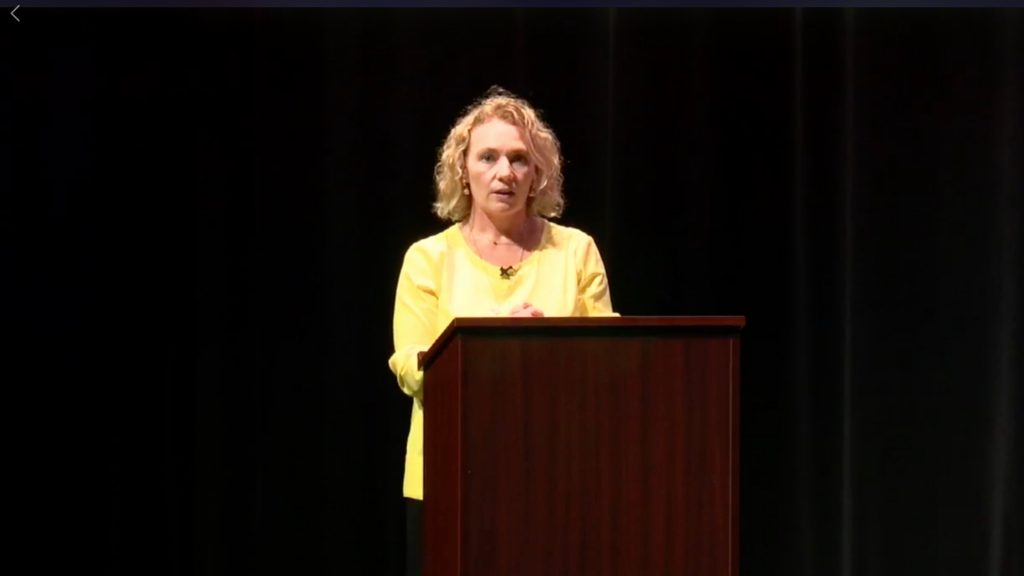 Both candidates indicated opposition to the ballot question about nursing ratios in hospitals. Calvo-Bacci suggested that health care costs could be reigned in through the greater use of cooperatives while Lewis wishes that Massachusetts could move from a “sick-care” system to a “well-care” system, focusing on promoting prevention, healthy living, and wellness.
Both candidates indicated opposition to the ballot question about nursing ratios in hospitals. Calvo-Bacci suggested that health care costs could be reigned in through the greater use of cooperatives while Lewis wishes that Massachusetts could move from a “sick-care” system to a “well-care” system, focusing on promoting prevention, healthy living, and wellness.
Both candidates indicated support for immigrants, with Lewis supporting the Safe Communities Act, stating that it protects immigrants from fear of mistreatment and prevents local law enforcement from being deputized into ICE. Calvo-Bacci feels that the government needs to find a way for people to get legal citizenship at an affordable rate. She is opposed to the Safe Communities Act as she believes that it makes it too cloudy for the police to follow the law.
In closing, Lewis described himself as a leader on Beacon Hill in fighting for public schools and that he has done it to support local communities. “I am running for re-election so I can help aid greater opportunities for all.” Calvo-Bacci closed reminding people that [Beacon Hill] needs to understand the unintended consequences of their choices and suggested that bringing more people to the table in decision making could be the answer. “It is time for change on Beacon Hill and I will be that change,” she concluded.
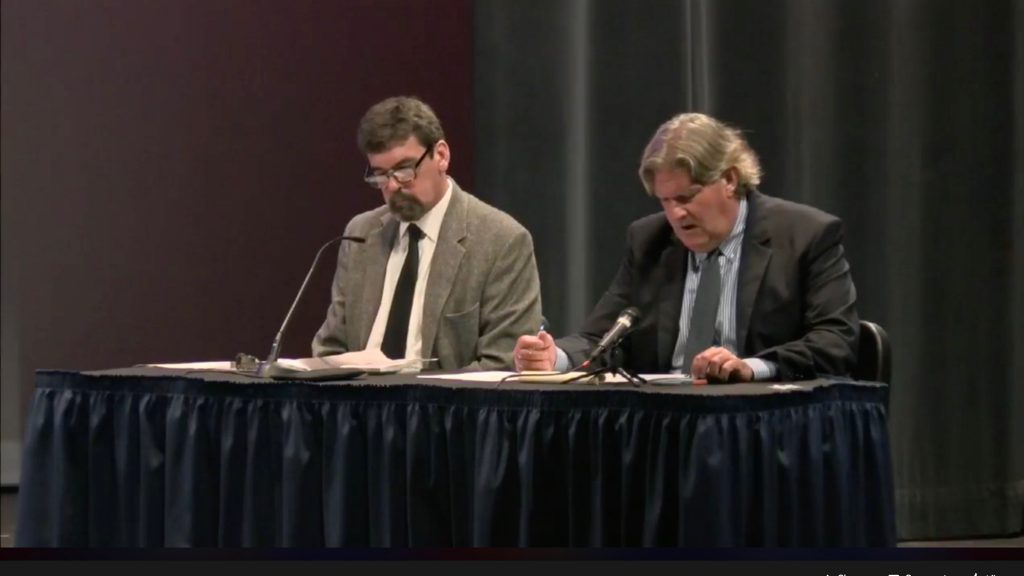 Carroll thanked the candidates for their ideas and reminded the audience to vote on November 6. “It is not your right, it is your responsibility,” Carroll commented.
Carroll thanked the candidates for their ideas and reminded the audience to vote on November 6. “It is not your right, it is your responsibility,” Carroll commented.
